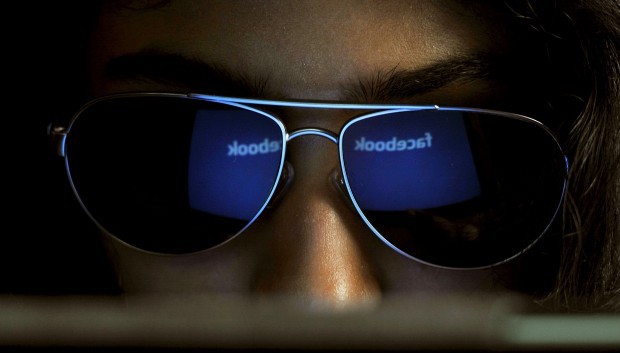
The ‘Facebook’ logo is reflected in a young woman’s sunglasses. (Manjunath Kiran/AFP/Getty Images)
Sharjah, Asharq Al-Awsat—The changing relationship between governments, their citizens and the media has become a hot topic in recent years, thanks to the convergence of trends in technological development, political upheaval and new forms of activism. It is a rare thing for a political leader not to have accounts and a presence on new media platforms and social networks like Twitter and Facebook, while rebel groups and political activists use them to organize themselves and interact with the media and the people.
Recent history shows that the Arab world is far from an exception, and as a result these issues are being studied and debated more and more by thinkers, politicians, officials and business people across the Middle East and beyond. Sharjah’s annual Government Communications Forum, now in its second year, represents one such attempt to examine the impact of these trends.
This year’s event, hosted in the Emirate last month, was attended by over 2,000 people, including a variety of experts and leaders in the world of politics and the media, including Turkish Prime Minister Recep Tayyip Erdogan and former UN Secretary–General Kofi Annan.
This year, the theme was primarily the need to foster real dialogue between governments and the people. Gilbert Domt, the founding director of the Beyond Reform and Development group highlighted the dangers of failing to adjust to this new reality, warning that while 70 percent of young Arabs used Facebook, politicians continued to treat it as if it were a part of the previous generation of media technologies, like television.
Raed Barqawi, editor of Al-Khaleej newspaper, echoed his comments, arguing that one major reason for the eruption of revolutions in the Arab world is the detachment between the people and governments, and also the prevalence of propaganda.
Ghassan Hajjar, editor-in-chief of the Lebanese Al-Nahar newspaper, disagreed about the role and importance of social media networks, saying: “It is such a big lie to consider the internet as a major cause for the eruption of Arab revolutions. There were geographic areas that saw mobilization and protests although the internet was yet to reach them. Perhaps, it is better to say that media outlets, whether traditional or modern, have worked together to produce such a result.”
But is this really something attainable for Arab youth? Former Lebabese Minister of Interior Ziyad Baroud, who has 60,000 ‘friends’ on his Facebook page and a similar number of followers on Twitter, said: “With regards to governments, we suffer from the lack of response, and sometimes officials have no answers to provide the people, and sometimes they have a real desire of posing obstacles between themselves and the people. Therefore, I’m calling for developing an investigative press that reveals such defects and gaps.”
Sultan Bin Ahmed Al-Qasemi, chairman of the Sharjah Media Center, which organized the forum, highlighted the efforts exerted by the emirate of Sharjah in establishing the “Government Communication Unit” the objective of which is to train civil servants in communication techniques in order to function as a bridge between different departments. However, the session that was dedicated to drawing up policies for the media and communications in Sharjah in the presence of journalists from the emirate saw some criticisms leveled against the newly–established unit.
Samy al-Riyami, editor-in-chief of Emirates Today, commented “For me, I do not prefer having a unit or office for public relations because it will shift over time into an obstacle hindering our contact with officials. The acquisition of information is the people’s absolute right, and if any official declines to provide the people with information, there would be hundreds of people who would do this voluntarily. We live in a small country and there is a diverse range of multimedia that must be exploited.”
Al-Riyami added, “I have no problem with the unit or its name, rather the problems lies in its content. We told the officials that we need the proper information in the proper time, and we want information to flow smoothly. A new culture has emerged and this forum is part of it.”
Among the sessions that were truly illuminating was that attended by Jim Messina. Messina explained that Obama’s second campaign was supposed to be fundamentally different in its message to the first one. He said Obama had assigned him to run the campaign 23 months before its due date. Messina accepted on the condition that Obama agree to the change in the same manner that companies change their marketing and promotional campaigns, reorienting towards the internet.
Messina argued that the Obama campaign’s use of Facebook was decisive in its victory, with the number of the Facebook supporters in the first campaign only one-tenth of the number in the second campaign. Furthermore, it was a must to filter the media and introduce regulations for debates. The Obama campaign was also successful in promoting a single message simultaneously on all media platforms: radio, television, and on-line. However, he noted that the campaign achieved its greatest penetration of the public’s consciousness not through its own message, but with the comments of Obama’s opponent, Mitt Romney, and his statement that he did not care about the 47 per cent of the American people who did not support him.
Messina concluded that the medium could only be as effective as the message, and vice-versa: it is possible to promote a message on Facebook and Twitter around the clock, but the average American only actually thought about politics for 20 minutes a week.
The forum showed that a long road lies ahead, and that even leaders that have assiduously used new media platforms and technologies, like Obama, have only begun to scratch the surface of what is possible, and have not always succeeded.
